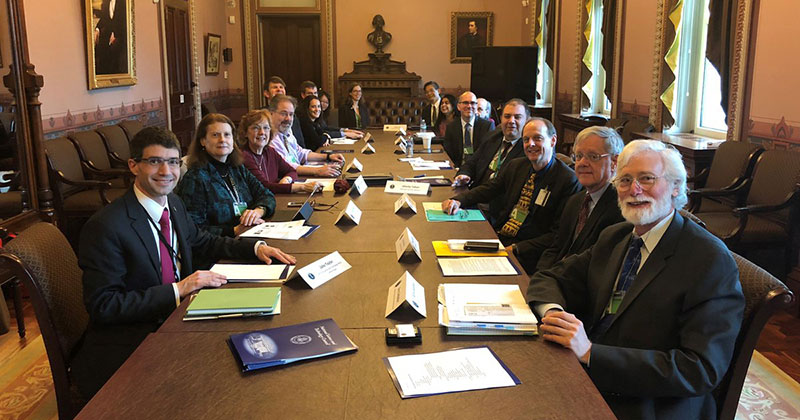Sometime this month the U.S. House Science Committee will introduce legislation to launch a 10-year National Quantum Initiative, according to a recent report by The American Institute of Physics (AIP). Details of the bill are not yet clear. Quantum computing – an important part of quantum information science (QIS) – has of course been receiving abundant attention in the U.S., from industry, academia, and government but rather loosely coordinated.
“Although technologies have long leveraged quantum physics, QIS uses some of the most elusive quantum phenomena to enable powerful new methods for measuring, processing, and transmitting information. Some of these technologies remain speculative but could be especially disruptive, such as quantum computers powerful enough to break existing encryption codes. Others are closer to commercialization, such as new sensors for inertial navigation and mass detection,” according to the article (Science Committee Seeks to Launch a National Quantum Initiative) by Mitch Ambrose.
Much of the proposed legislation was informed by a House Science Committee meeting on quantum information science last October at which attendees suggested the QIS field is at an inflection point, reports Ambrose. White House Office of Science and Technology Policy’s top QIS official, NIST physicist Jake Taylor, didn’t comment specifically on the draft legislation but indicated a strong interest in fostering effective national coordination of quantum research and development. Here’s an excerpt from the Ambrose article.
“To manage the National Quantum Initiative, the bill would establish a national coordinating office, task the National Science and Technology Council (NSTC) with developing strategic plans for federal agencies, and create an advisory committee of external stakeholder representatives.
“At the agency level, the bill would authorize DOE to establish several QIS R&D centers, each of which would be a “testbed” for different types of quantum technology, such as sensing, communications, and computing. The aide acknowledged this provision was “heavily influenced” by a proposal from the National Photonics Initiative(NPI) an advocacy group led by scientific societies, and said the authorizing language is similar to that used for DOE’s Nanoscale Science Research Centers and Bioenergy Research Centers.
“For NSF, the bill would authorize the agency to create centers that are focused on academic research and longer-term workforce development, drawing on the model of the agency’s current Engineering Research Centers. The aide said the committee is still “fleshing out” the NIST provisions, noting that input to the committee indicated the QIS field is not yet ready for standards development.”

(Image credit – OSTP, published in AIP)
If a National Quantum Initiative bill is indeed submitted, winning passage and finding funding are the next challenges. As described, it envisions an ambitious whole-of-government program approach, and depending upon your perspective such efforts have produced mixed results. It’s only been three years since President Barack Obama created the National Strategic Computing Initiative (NCSI). The swell of initial enthusiasm for NSCI has faded somewhat as its scope seems to have been curtailed and many NSCI components have turned out to be pre-existing programs – notably those associated with U.S. exascale computing efforts – that have been placed under the NSCI umbrella.
In any case, NPI released a National Quantum Initiative Action Plan in April which it likely hopes will provide a model for the House Science Committee. It is an expansive (and seemingly expensive) agenda prepared by some prominent figures in quantum science[i]. Here are a couple of items from the plan:
- “NQI will be anchored by three to six new facilities called Quantum Innovation Laboratories (QILabs), along with a Quantum Research Network(QRNet) and a Quantum Computing Access Program (QCAP). Each QILab will be located at a central facility in the U.S. and have a distinct and focused research and development mission and may include satellite QILab participants and facilities as appropriate.”
- “The QILab, QRNet and QCAP components of NQI will be administered through the civilian agencies NSF, NIST, and DOE with an overall budget of $800 million over an initial 5-year phase. This includes a $500 million budget for the QILabs, with some funded at higher levels around $25 million per year, while others will have lower funding needs. The QRNet will be funded at $200 million, or $40 million per year, and the QCAP will be funded at a level of $100 million over five years.”
Hard to see how those numbers would be adopted by Congress but it’s also hard to predict what Congress will do given the emerging global competition to explore quantum technologies and develop useful applications. China is said to have earmarked $11 billion for quantum computing including a single large research facility. Just this spring the Department of Energy FY ‘19 budget included $105 million for quantum related research (see HPCwire article, Spring Meetings Underscore Quantum Computing’s Rise).
Link to full article (Science Committee Seeks to Launch a National Quantum Initiative): https://www.aip.org/fyi/2018/science-committee-seeks-launch-national-quantum-initiative
Link to National Quantum Initiative—Action Plan released in April 2018: https://www.lightourfuture.org/getattachment/85484dca-465a-46f4-8c8c-090aeb845d09/FINAL-Action-Plan-for-a-NQI-Apr-3-2018.pdf
For an overview of issues facing quantum computing, see HPCwirearticle. Hyperion Tackles Elusive Quantum Computing Landscape
[I]Preparers of the NPI Action Plan: David Awschalom (University of Chicago), Kenneth Brown (Duke University), James Clarke (Intel), Scott Crowder (IBM), Mark Kasevich (Stanford University), Mikhail Lukin (Harvard University), David Moerhing (IonQ), Christopher Monroe University of Maryland), Hartmut Neven (Google), Ross Niebergall (Harris Corp) William Oliver (MIT), Tom Pieronek (Northrup-Grumman), John Preskill (Caltech), Michael Raymer (University of Oregon), Chad Rigetti (Rigetti), Irfan Siddiqi (UB Berkeley), Edward White (National Photonics Initiative)




























































